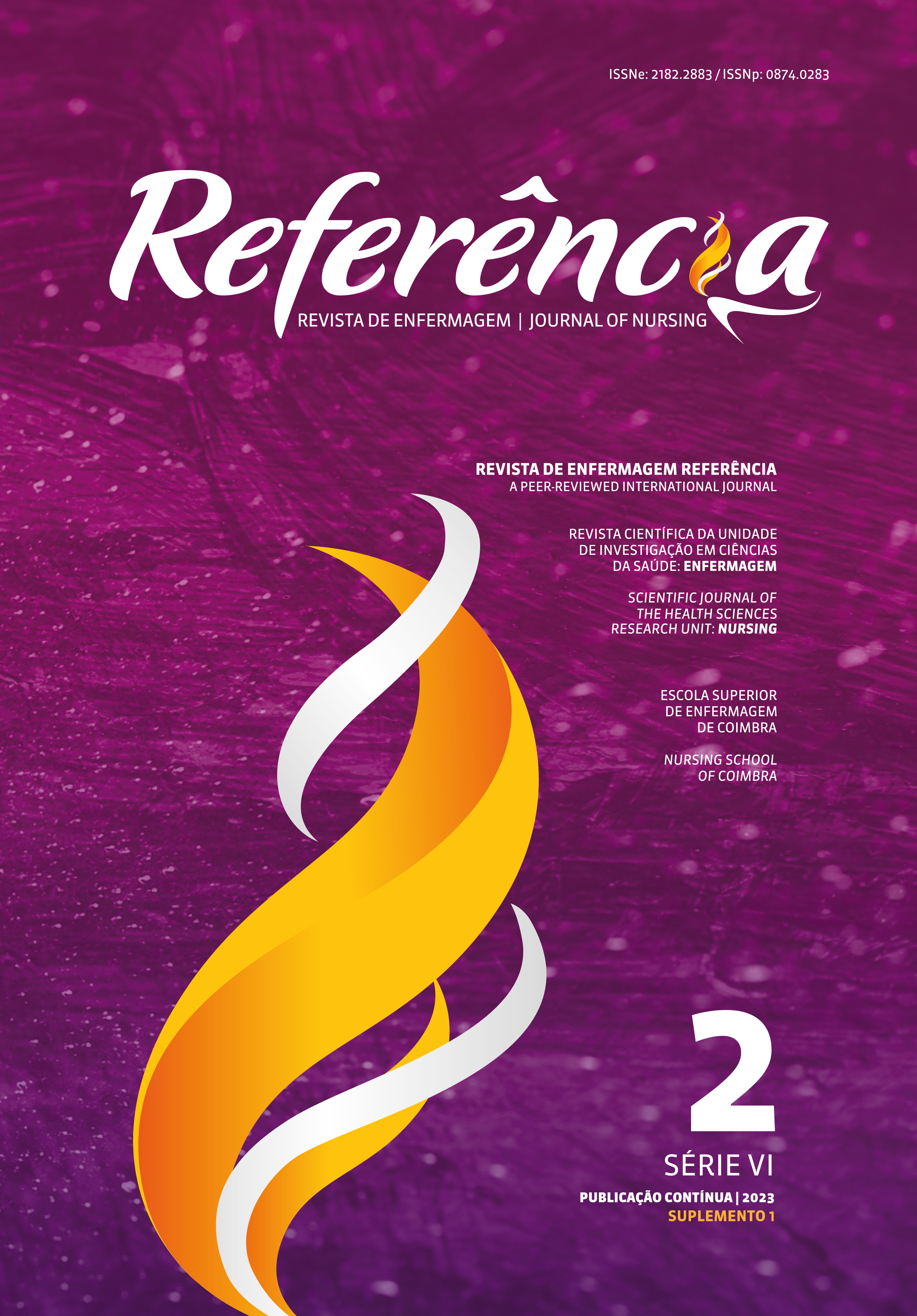Projeto de melhoria contínua no cuidado à pessoa com difagia para promover a implementação de evidências
DOI:
https://doi.org/10.12707/RVI22010Palavras-chave:
enfermagem, transtornos de deglutição, melhoria de qualidade, prática baseada em evidência, acidente vascular cerebralResumo
Enquadramento: Existe evidência de que a sistematização da abordagem terapêutica à pessoa com deglutição comprometida após o acidente vascular cerebral (AVC) tem um impacte significativo na redução de complicações.
Objetivo: Conceber e implementar uma intervenção multimodal para a implementação da evidência, na sistematização da abordagem à pessoa com deglutição comprometida.
Metodologia: Projeto de melhoria contínua da qualidade dos cuidados de enfermagem desenvolvido num serviço de internamento de reabilitação, em cinco fases: análise do modelo em uso, construção da intervenção, implementação, avaliação e partilha dos resultados. Para a recolha de dados utilizaram-se a análise à documentação, a auditoria e grupos focais.
Resultados: Verificou-se um incremento de 39,59% nos focos de enfermagem identificados e de 45,33% de intervenções, assim como a transposição para a prática da evidência ao nível da avaliação, da sistematização das práticas, acompanhamento durante as refeições e higiene oral.
Conclusão: Este projeto contribuiu para a transposição do conhecimento para a prática, nomeadamente para o sucesso do plano terapêutico da pessoa alvo dos cuidados, concretamente no âmbito da deglutição comprometida.
Downloads
Referências
Akbiyik, A., Akin Korhan, E., Kiray, S., & Kirsan, M. (2020). Th effect of nurses’ leadership behavior on the quality of nursing care and patient outcomes. Creative Nursing, 26(1), e8–e18. https://doi.org/10.1891/1078-4535.26.1.E8
Baatiema, L., Otim, M. E., Mnatzaganian, G., de-Graft Aikins, A., Coombes, J., & Somerset, S. (2017). Health professionals’ views on the barriers and enablers to evidence-based practice for acute stroke care: A systematic review. Implementation Science, 12(1), Article 74. https://doi.org/10.1186/s13012-017-0599-3
Charmaz, K. (2006). Constructing grounded theory: A practical guide through qualitative analysis. Sage.
Cohen, D. L., Roffe, C., Beavan, J., Blackett, B., Fairfield, C. A., Hamdy, S., Havard, D., McFarlane, M., McLauglin, C., Randall, M., Robson, K., Scutt, P., Smith, C., Smithard, D., Sprigg, N., Warusevitane, A., Watkins, C., Woodhouse, L., & Bath, P. M. (2016). Post-stroke dysphagia: A review and design considerations for future trials. International Journal of Stroke, 11(4), 399-411. https://doi.org/10.1177/1747493016639057
Dziewas, R., Beck, A. M., Clave, P., Hamdy, S., Heppner, H. J., Lang more, S. E., Leischker, A., Martino, R., Pluschinski, P., Roesler, A., Shaker, R., Warnecke, T., Sieber, C. C., Volkert, D., & Wirth, R. (2017). Recognizing the importance of dysphagia: Stumbling blocks and stepping stones in the twenty-first century. Dysphagia, 32, 78–82. https://doi.org/10.1007/s00455-016-9746-2
Flodgren, G., Hall, A. M., Goulding, L., Eccles, M. P., Grimshaw, J. M., Leng, G. C., & Shepperd, S. (2016). Tools developed and disseminated by guideline producers to promote the uptake of their guidelines. Cochrane Database of Systematic Reviews, 8, Article CD010669. https://doi.org/10.1002/14651858.CD010669.pub2
Flodgren, G., O’Brien, M. A., Parmelli, E., & Grimshaw, J. M. (2019). Local opinion leaders: Effects on professional practice and health care outcomes. Cochrane Database of Systematic Reviews, 6, Article CD000125. https://doi.org/10.1002/14651858.CD000125.pub5
Hartzell, T. A., & Fineout-Overholt, E. (2017). The evidence-based practice competencies related to searching for best evidence. In B. M. Melnick, L. Gallagher-Ford & E. Fineout-Overholt (Eds.), Implementing the evidence-based practice (EBP) competencies in healthcare : A practical guide to improving quality, safety, and outcomes (pp. 55–76). McGraw Hill.
Hines, S., Kynoch, K., & Munday, J. (2016). Nursing interventions for identifying and managing acute dysphagia are effective for improving patient outcomes: A systematic review update. Journal of Neuroscience Nursing, 48(4), 215–223. https://doi.org/10.1097/JNN.0000000000000200
Kotter, J. P. (2009). Leading change: Why transformation efforts fail. IEEE Engineering Management Review, 37(3), 42–48. https://doi.org/10.1109/EMR.2009.5235501
Lawal, A. K., Rotter, T., Kinsman, L., Machotta, A., Ronellenfitsch U., Scott, S. D., Goodridge, D., Plishka, C., & Groot, G. (2016). What is a clinical pathway?: Refinement of an operational definition to identify clinical pathway studies for a Cochrane systematic review. BMC Medicine, 14(1), Article 35. https://doi.org/10.1186/S12916-016-0580-Z
Middleton, S., Coughlan, K., Mnatzaganian, G., Choy, N. L., Dale, S., Jammali-Blasi, A., Levi, C., Grimshaw, J. M., Ward, J., Cadilhac, D. A., McElduff, P., Hiller, J. E., & D’Este, C. (2017). Mortality reduction for fever, hyperglycemia, and swallowing nurse-initiated stroke intervention: QASC Trial (Quality in Acute Stroke Care) follow-up. Stroke, 48(5), 1331–1336. https://doi.org/10.1161/STROKEAHA.116.016038
Oliveira, I. J., Almeida, S. I., Mota, L. A., & Couto, G. R. (2020). Conceptualization of nursing care to the person with post-stroke dysphagia. Revista de Enfermagem Referencia, 5(4), e20024. https://doi.org/10.12707/RV20024
Oliveira, I. J., Couto, G. R., & Mota, L. A. (2019). Nursing therapies in the person with post-stroke dysphagia. Revista de Enfermagem Referência, 4(23), 133-140. https://doi.org/10.12707/RIV19057
Oliveira, I. J., Couto, G. R., & Mota, L. A. (2020). Nurses’ preferred items for dysphagia screening in acute stroke patients: A quali study. Nursing Practice Today, 7(3), 226–233. https://doi.org/10.18502/npt.v7i3.3351
Ordem dos Enfermeiros, Conselho de Enfermagem Regional, Secção Sul. (2013). Guião para a organização de projetos de melhoria contínua da qualidade dos cuidados de enfermagem. https://www.ordemenfermeiros.pt/arquivo/sites/sul/informacao/Documents/Gui%C3%A3o%20para%20elaborac%C2%B8%C3%A3o%20projetos%20qualidade%20SRS.pdf
Shayan, S. J., Kiwanuka, F., & Nakaye, Z. (2019). Barriers associated with evidence-based practice among nurses in low- and middle-in come countries: A systematic review. Worldviews on Evidence-Based Nursing, 16(1), 12–20. https://doi.org/10.1111/WVN.12337
Sivertsen, J., Graverholt, B., & Espehaug, B. (2017). Dysphagia screening after acute stroke: A quality improvement project using criteria-based clinical audit. BMC Nursing, 16, Article 27. https://doi.org/10.1186/s12912-017-0222-6
Tsai, C. H., Eghdam, A., Davoody, N., Wright, G., Flowerday, S., & Koch, S. (2020). Effects of electronic health record implementation and barriers to adoption and use: A scoping review and qualitative analysis of the content. Life, 10(12), 327. https://doi.org/10.3390/LIFE10120327
Vabo, G., Slettebø, Å., & Fossum, M. (2017). Participants’ perceptions of an intervention implemented in an Action Research Nursing Documentation Project. Journal of Clinical Nursing, 26(7–8), 983–993. https://doi.org/10.1111/jocn.13389

















